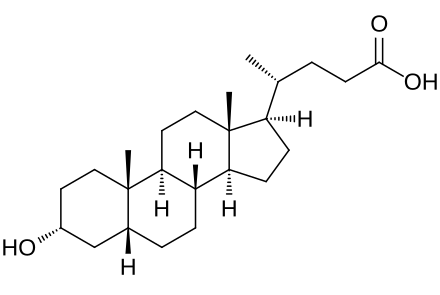A naturally occurring compound involved in digestion lengthens lifespan in flies and makes old mice more youthful.
Why eating less slows aging: this molecule is key

Lithocholic acid, also known as 3α-hydroxy-5β-cholan-24-oic acid or LCA, is a bile acid that acts as a detergent to solubilize fats for absorption. Bacterial action in the colon produces LCA from chenodeoxycholic acid by reduction of the hydroxyl functional group at carbon-7 in the “B” ring of the steroid framework.
Can Probiotics Help with Lithocholic Acid Synthesis?
Lithocholic acid (LCA) is a secondary bile acid synthesized by certain gut bacteria through the 7α-dehydroxylation of primary bile acids like cholic acid (CA) and chenodeoxycholic acid (CDCA). These metabolic processes primarily involve bacteria native to the gut, such as Clostridium scindens and related species. The question arises: Can you obtain these LCA-producing bacteria through probiotics? Let’s explore this in detail.
The Role of Gut Flora in LCA Synthesis
LCA production hinges on the activity of specific gut bacteria capable of modifying bile acids. Key players include:
- Clostridium species: Especially Clostridium scindens, well-documented for its 7α-dehydroxylation activity. Other contributors include Clostridium hiranonis and Clostridium leptum.
- Eubacterium species: Strains within this genus also participate in secondary bile acid metabolism.
These bacteria are anaerobic and part of the normal gut microbiota. However, they are not typically included in commercial probiotics due to their strict growth requirements and regulatory challenges.
Probiotics and Indirect Support for LCA Production
Although probiotics do not usually contain LCA-producing bacteria, they can indirectly support LCA synthesis by creating an optimal gut environment. Here are some ways probiotics may help:
- Enhancing Native Microbiota:
Probiotics like Lactobacillus and Bifidobacterium improve gut health and support the native gut flora, including LCA producers. - Promoting Bile Acid Transformation:
Some probiotic strains can deconjugate primary bile acids, producing free bile acids that gut bacteria can convert into LCA. - Balancing the Gut Environment:
Probiotics can maintain a healthy gut environment, ensuring that harmful bacteria do not outcompete beneficial LCA-producing species.
Probiotics That May Influence Bile Acid Metabolism
While standard probiotics do not directly produce LCA, certain strains can indirectly support bile acid metabolism:
- Lactobacillus rhamnosus: Known to bind bile acids and potentially reduce the harmful effects of excess LCA.
- Bifidobacterium breve: Promotes gut health by maintaining microbial balance.
- Saccharomyces boulardii: A probiotic yeast that supports gut barrier function and may indirectly assist bile acid metabolism.
How to Support LCA Production Naturally
- Dietary Adjustments:
- Eat foods rich in prebiotics, like resistant starch, inulin, and fibrous vegetables, to feed beneficial gut bacteria.
- Include healthy fats and bitter greens, stimulating bile flow and enhancing bile acid metabolism.
- Probiotic Supplements:
- Use broad-spectrum probiotics to increase microbial diversity, indirectly supporting LCA-producing bacteria.
- Emerging Therapies:
- While not yet widely available, future anaerobic probiotics may include strains like Clostridium scindens.
- Fecal Microbiota Transplantation (FMT) can restore a balanced gut microbiome, including potential LCA producers.
Conclusion
Though commercial probiotics do not directly provide LCA-producing bacteria, they play a crucial role in maintaining a healthy gut environment that supports these native species. Combining probiotics with a diet rich in prebiotics and bile-stimulating foods can optimize conditions for natural LCA synthesis. As research progresses, advanced probiotics may one day include specific LCA-producing strains, offering a more direct solution.
By fostering a healthy gut microbiome, you not only support bile acid metabolism but also enhance overall digestive and systemic health.
